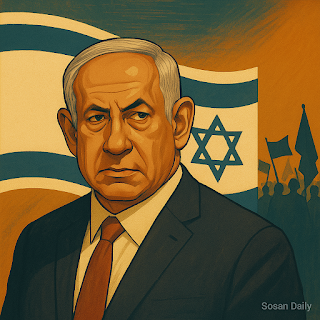[ Israel Watch #02] Benjamin Netanyahu's Hardline Stance and Israel's Growing Internal Divide
An in-depth analysis of Benjamin Netanyahu’s hardline security policies and the growing divide within Israeli society amid escalating tensions with Iran. Explore how domestic unrest and coalition cracks are shaping the nation’s future.
Benjamin Netanyahu's Hardline Stance and Israel's Growing Internal Divide
— Between Security and Democracy: A Nation in Turmoil
Table of Contents
- 1. Introduction – Netanyahu’s War Doctrine Returns
- 2. The 2025 Airstrikes and Shifts in Defense Policy
- 3. A Nation Divided – Security First vs. Peace Advocates
- 4. Cracks in the Coalition and the Opposition's Momentum
- 5. Public Fatigue and the Weight of Endless Conflict
- 6. The International Fallout – Diplomacy Under Pressure
- 7. Conclusion – Is Netanyahu’s Strategy Sustainable?
- 8. FAQ
1. Introduction – Netanyahu’s War Doctrine Returns
Prime Minister Benjamin Netanyahu has long been synonymous with hardline national security policies. In 2025, as tensions with Iran flared into open strikes, Netanyahu’s leadership once again leaned into a doctrine of deterrence by force. While his supporters hail him as Israel’s unwavering guardian, critics argue his approach is reigniting regional instability and fraying domestic unity.
2. The 2025 Airstrikes and Shifts in Defense Policy
In June 2025, Israeli forces launched surprise airstrikes on Iranian nuclear facilities, citing escalating threats and intelligence assessments. Netanyahu called it a "preemptive necessity," positioning Israel’s survival above all diplomatic hesitation. The move sparked global debate — while some allies voiced quiet support, many warned of disproportionate force and called for de-escalation.
3. A Nation Divided – Security First vs. Peace Advocates
Public opinion in Israel is now sharply polarized. While one side supports decisive military actions to deter adversaries, the other decries the lack of diplomatic effort. Civil society activists, many from the youth and progressive sectors, warn that unending military campaigns are exhausting the nation’s morale and undermining democracy.
4. Cracks in the Coalition and the Opposition's Momentum
Netanyahu’s right-wing coalition is holding — but barely. Hard-right parties demand even bolder retaliation, while moderates within the bloc fear Israel is isolating itself globally. Meanwhile, opposition leaders are capitalizing on public unrest, calling for snap elections and raising questions about Netanyahu’s long-term vision for Israel’s future.
5. Public Fatigue and the Weight of Endless Conflict
After the 2023-2024 Gaza conflict and now the Tehran escalation, Israeli citizens are experiencing widespread war fatigue. The economy is strained, reserve troops have been repeatedly mobilized, and air travel disruptions are impacting daily life. Young Israelis, in particular, are expressing growing disenchantment with perpetual military readiness as a way of life.
6. The International Fallout – Diplomacy Under Pressure
While the U.S. administration affirms Israel’s right to self-defense, it has also urged restraint. The EU is pushing for renewed peace talks, and the UN is once again spotlighting civilian casualties. Israel’s aggressive stance is putting a strain on its diplomatic ties — and that strain may ripple through trade, technology, and security collaborations.
7. Conclusion – Is Netanyahu’s Strategy Sustainable?
Netanyahu's return to hardline politics may satisfy his base, but it risks alienating moderates, both at home and abroad. In a nation perpetually balancing security needs with democratic values, the question looms large: Can Israel continue down this path without eroding the very foundations it seeks to protect?
8. FAQ
- Q1. Why is Netanyahu taking such an aggressive stance?
A. He views Iran as an existential threat and believes military strength is Israel’s best deterrent. Political considerations also play a role in rallying his conservative base.
- Q2. What’s the mood inside Israel?
A. Divided. Some feel more secure, others fear prolonged conflict and growing international isolation. Youth protests and calls for diplomacy are intensifying.
- Q3. Could the government collapse over this?
A. It’s possible. Netanyahu’s coalition is fragile. If internal dissent worsens, it could trigger early elections.
- Q4. Will this escalate into a full-scale war?
A. That depends on Iran’s response and global diplomacy. So far, it remains contained, but one misstep could ignite broader conflict.
📌 Related Posts – Israel Watch Series
📌 Related Posts – Middle East Watch Series
- [Middle East Watch #01] Israel’s Airstrike on Iran – 2025 Crisis Overview
- [Middle East Watch #02] Why Did Iran Abandon Proxy Tactics? – The Unprecedented Nature of Its Direct Strike on Israel
- [Middle East Watch #03] Trump Demands Iran’s Surrender – “We Know Where the Supreme Leader Hides”
- [Middle East Watch #04] Trump Launches Strikes on Iran’s Nuclear Sites: “A Spectacular Military Success”





Comments
Post a Comment